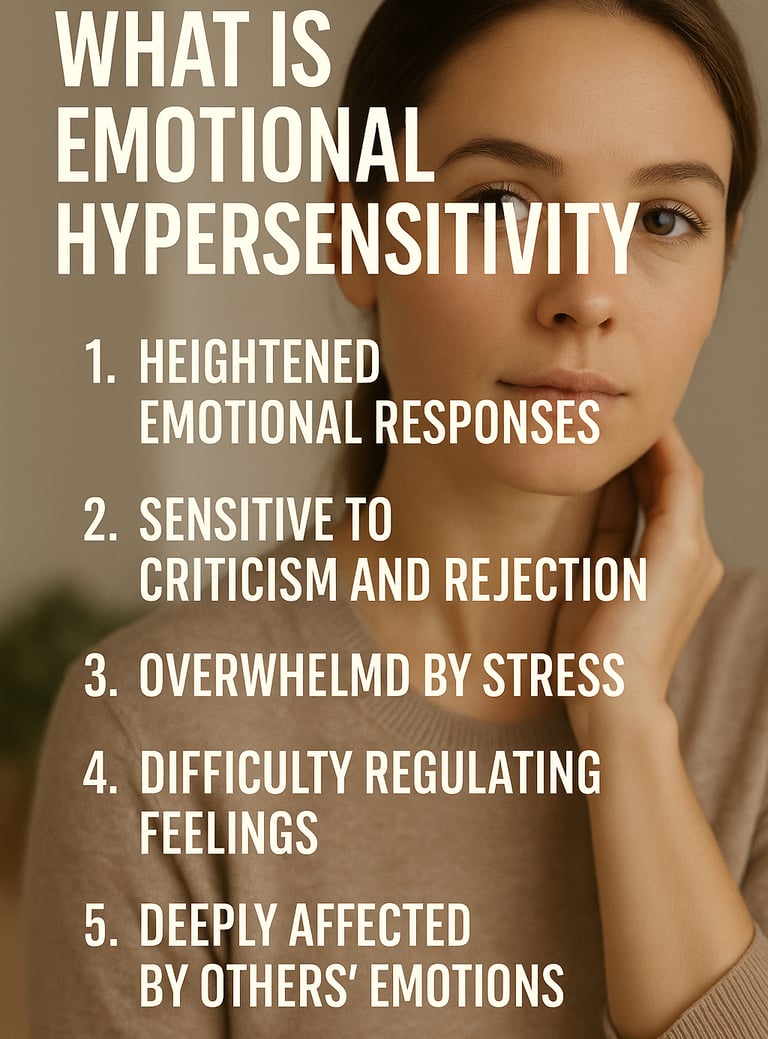What Does It Mean to Be Emotionally Hypersensitive?
Discover what emotional hypersensitivity really means, its common signs, causes, and how to cope with it. Learn strategies to embrace your sensitivity and protect your mental well-being.
WELLNESSBLOG-LIST
Narcisse Bosso
9/12/20252 min read


In Brief
Emotional hypersensitivity is often misunderstood. While some see it as “being too sensitive,” it’s actually a heightened emotional awareness that can affect how someone perceives and reacts to everyday situations. Being emotionally hypersensitive isn’t inherently negative, it comes with strengths and challenges. This guide explains what it means, how to recognize it, and healthy ways to manage it.
Table of Contents
What Is Emotional Hypersensitivity?
Common Signs of Emotional Hypersensitivity
Possible Causes and Triggers
The Pros and Cons of Being Highly Sensitive
Coping Strategies for Emotional Hypersensitivity
FAQ
Conclusion
1. What Is Emotional Hypersensitivity?
Emotional hypersensitivity refers to a stronger-than-average emotional reactivity to external or internal stimuli. People who are hypersensitive often:
Feel emotions more intensely,
React strongly to criticism or conflict,
Get easily overwhelmed in stressful environments.
It’s not a disorder but a personality trait that can be influenced by genetics, environment, or past experiences.
2. Common Signs of Emotional Hypersensitivity
Feeling hurt easily by words or tone of voice.
Being deeply moved by music, movies, or art.
Needing time alone to recover after social interactions.
Physical responses like stomach knots or tears under stress.
Struggling to let go of past emotional wounds.
3. Possible Causes and Triggers
Genetics: some people are naturally more sensitive.
Childhood experiences: trauma, lack of validation, or overprotection.
Stress or fatigue: lowers emotional resilience.
Hormonal changes: can amplify emotional responses.
👉 Read also: Fuel your Mind
4. The Pros and Cons of Being Highly Sensitive
Pros:
Strong empathy and compassion.
Deep creativity and intuition.
Ability to sense subtle changes in others’ moods.
Cons:
Prone to anxiety or overwhelm.
More vulnerable to emotional exhaustion.
Risk of isolation if sensitivity isn’t understood.
5. Coping Strategies for Emotional Hypersensitivity
Set boundaries: protect your emotional energy.
Practice mindfulness or meditation: to calm racing thoughts.
Prioritize self-care: rest, hobbies, and healthy routines.
Seek supportive relationships: avoid toxic environments.
Therapy or coaching: learn coping tools to reframe hypersensitivity.
FAQ
1. Is emotional hypersensitivity a mental illness?
No. It’s a personality trait, not a disorder.
2. Can hypersensitivity change over time?
Yes, life experiences and stress levels can make it stronger or weaker.
3. Are emotionally hypersensitive people more creative?
Often, yes. Their deep emotional awareness is linked to creativity.
4. How can I support a hypersensitive loved one?
Listen with empathy, avoid harsh criticism, and respect their need for space.
5. Can hypersensitivity turn into anxiety or depression?
If unmanaged, yes. But with the right tools, it can become a strength.
Conclusion
Being emotionally hypersensitive doesn’t mean weakness, it means experiencing life with heightened awareness. By recognizing triggers, setting boundaries, and practicing self-care, hypersensitivity can be transformed into a source of strength, empathy, and creativity.
💡 Action step: This week, try one coping strategy, like mindfulness or journaling to better understand and embrace your emotions.
✍️ Written by Narcisse Bosso, certified naturopath. His lifelong passion for health became a profound calling after a loved one passed away from a natural illness that could have been prevented with simple lifestyle changes and habits.
